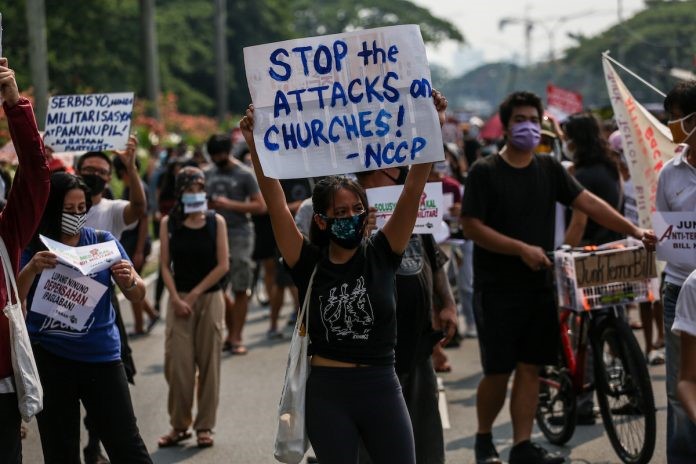Philippines’ Anti-Terrorism Act is reminiscent of the dark history of martial law era, says CCA General Secretary
 A demonstration against the Anti-Terrorism Bill in the Philippines by Church groups (Photo by Basilio Sepe)
A demonstration against the Anti-Terrorism Bill in the Philippines by Church groups (Photo by Basilio Sepe)
CHIANG MAI: The Philippines’ new ‘Anti-Terrorism Act’, which took effect on Saturday, 18 July 2020, is reminiscent of the use of repressive force and human rights violations of the dark history of martial law era, stated the General Secretary of the Christian Conference of Asia (CCA), Dr Mathews George Chunakara.
In a statement released on behalf of the CCA, the General Secretary stated that the new Anti-Terrorism Act would undermine basic freedoms and human rights as it would give overreaching powers to the Philippines government and would pave the way for large-scale violations of human rights. He further said that CCA condemned how the contentious Anti-Terrorism Act bill was fast-tracked and approved in both Houses of the Philippine Congress while the entire country’s attention was focused on the rampant spread of the COVID-19 pandemic.
The statement of the CCA General Secretary observed that the new law, under the Act’s ambiguous definition of terrorism, granted the government sweeping powers to curtail freedoms and criminalise acts that incite terrorism “by means of speeches, proclamations, writings, emblems, banners, or other representations”. It also bestowed the President with the power to create an Anti-Terrorism Council that could tag individuals and groups as terrorists, allow authorities to detain suspected terrorists without charge for up to twenty-four days, and permit the government to conduct ninety days of surveillance and wiretaps.
The UN Human Rights Council (UNHRC) Report on the ‘Human Rights Situation in the Philippines’ (UNHRC 44th Session, 30 June–20 July 2020) also expressed concern on the danger posed by the Anti-Terrorism Act.
Local and international human rights groups have voiced their concern and apprehension that the legislation could be abused to target the administration’s opponents, using the presidentially-appointed Anti-Terrorism Council that could designate anyone suspected a ‘terrorist’.
The CCA General Secretary’s statement also stated, “The CCA stands in solidarity with the peace-loving and progressive Filipino people in opposing the Anti-Terror Act. The CCA is alarmed at and condemns this law as a menace to the fundamental rights of the Filipino people. The CCA calls upon its member churches and councils to pray for the safety of the Filipino people, as they face an uncertain future.”










